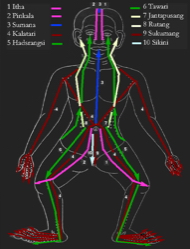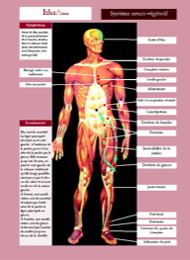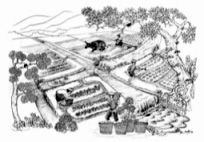Thaï meridians : Sensip
|
|
The Institute of Alternative and Traditional medicines at the Thailand Department of Health has published
numerous documents based on over thirty years of research, which conclude that : «1- Sensip are energy lines which follow muscular-tendon lines. 2- The primary aim of working on sensip is to release myofascial tensions. 3- Specific clinical studies have demonstrated the efficacy of certain Nuad Boran manipulations, when performed by qualified practitioners.» As far back as memory goes, Thaïs have been rice growers and irrigators. Their mode of thinking is concrete. Is a strip of rice field drying out? An upstream canal gate is opened. If water is too stagnant, a downstream water-gate is opened. They know to conserve their energy for the long run.
The domain of Nuad Boran includes all ‘sensip’ which need to be irrigated by moving liquid elements. Once a good circulation of ‘sen’ has been reestablished, Thaïs trust the body’s capacity for self-regulation, just as they trust plants to grow as soon as they are well irrigated. Land has been cultivated during centuries by repeatedly plowing back and forth furrows. This is the root concept Thaïs apply when working on ‘sen’: one follows the tendon-muscular lines all the way up and down. Muscular fibers are ploughed along the myofascial lines that are instinctively identified because the practitioners have seen their elders doing so, because palpation makes it easy to locate these lines and because the The most similar approach to the work on Thaï lines is that of Chinese medicine. In addition to the twelve main lines used in acupuncture, there are associated tendon-muscular lines (jing-luo) which run through the whole body following networks which are very similar to ‘sensip’. In Chinese medicine however, these paths are not meant for The Thaï viewpoint depends on tangible effects. Anticipating the felt affect and a sort of « muscular empathy » are both part of an ancestral instinct accumulated from one generation to another which give Thaï bodywork its own characteristics. Nuad Boran works on tendon lines which are similar to Chinese muscular lines while adding the specific Thaï style: |







